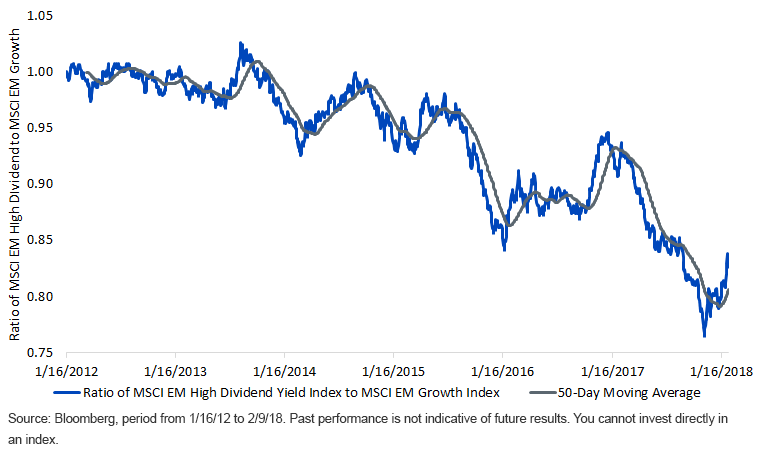Is the Sell-Off Creating a Buying Opportunity in Emerging Markets?


Market corrections are like forks in the road. One road may lead to the next bear market. The other may lead to all-time highs. It’s hard to know in the moment what the future path holds or which road to take, especially as bull markets age. This is one of the reasons investors who try to time or trade the market miss out on its long-term returns.
For example, when U.S. stocks last experienced a 10% decline some two years ago, it took six months before stocks successfully retested their correction lows. But investors who were not spooked by the 10% declines in August 2015 and February 2016 were rewarded with another 60% gain in the S&P 500 through January 2018. In long-lasting bull markets, sometimes the risk is not selling too late, but selling too early.
If you are later in life and cannot endure the potential for another 20% to 40% drop in the equity portion of your portfolio, you must respect the violent fluctuations in stock prices in early February 2018. If this is the beginning of the next bear market, you may be well served to realize some past profits and redeploy to cash or shorter-term fixed income.
But if you are younger—or if you are older, well diversified and can endure greater volatility—you may view the recent sell-off as a buying opportunity. And some advisors who rebalanced client portfolios in January may see this moment as an early opportunity to harvest short-term losses for clients in taxable accounts.
Investors in this second group may also see the present moment as an opportune time to upgrade positions in their emerging market equity allocations. Compared to the S&P 500, EM equities trade at a lower multiple, are experiencing faster earnings growth and are poised to benefit from strong global gross domestic product (GDP) growth and a relatively benign U.S. dollar.
Right now, we may be at an important inflection point in emerging market equities, where value stocks, particularly in the higher-dividend-yielding segment of the market, begin once again to outperform EM growth stocks. In four of the last five years, for example, the MSCI EM Value Index underperformed the MSCI EM Growth Index. But year-to-date that has reversed, with MSCI EM Value outperforming MSCI EM Growth, while the MSCI Emerging Markets High Dividend Yield Index is beating both.
To help visualize this relationship, we have created a ratio between the MSCI Emerging Markets High Dividend Yield Index and the MSCI Emerging Markets Growth Index and tracked that ratio through time over the past six years, the longest period for which real-time returns exist for both Indexes.
Returns of MSCI EM High Dividend Index Compared to MSCI EM Growth Index, 2012–2018

For definitions of terms in the graph, please visit our glossary.
After peaking in 2013 and zigzagging throughout 2015, the higher-dividend-yielding segment of emerging markets trended downward through the end of 2017 on a relative basis when compared to MSCI Growth. That ratio bottomed out in January 2018 and has since rebounded sharply, crossing through the 50-day moving average and reversing the trend of that 50-day moving average with the most robust uptrend since late 2016.
We believe one of the best ways to get exposure to both the value segment of emerging markets and the higher-dividend-yielding stocks within that segment is through the WisdomTree Emerging Markets High Dividend Index. Each year, the Index selects companies whose trailing 12-month dividend yields rank within the top 30% of the WisdomTree Emerging Markets Dividend Index, an Index that seeks to measure the performance of all investable dividend-paying companies in emerging markets with market capitalizations of at least $200 million.
Because both Indexes weight their components annually based on the U.S. dollar value of the cash dividends paid over the prior 12 months, both Indexes typically exhibit higher dividend yields than comparable cap-weighted indexes. What the graph above does not show is how such dividend- weighted exposures in the emerging world have performed over the past 10 years. And while they have lagged over the last three- and five-year periods, over the full market cycle of the last decade, both WisdomTree Indexes generated excess returns compared to the MSCI Emerging Markets Index—and they did so while exhibiting lower volatility.
Risk and Return Date for WisdomTree Emerging Markets Dividend Indexes vs. MSCI EM Index


For definitions of terms in the graph, please visit our glossary.
Conclusion
After a period of relative underperformance, value is making a comeback in emerging markets, led by its higher-dividend-yielding stocks. For investors looking to re-establish or add to allocations in emerging market equities, WisdomTree’s two dividend-weighted strategies provide potential to increase dividend income, reduce volatility or increase long-term returns compared to traditional “beta” exposures.
For investors looking to maximize yield, the WisdomTree Emerging Markets High Dividend Fund (DEM), which tracks the WisdomTree Emerging Markets High Dividend Index, remains WisdomTree’s most appealing option in emerging markets. For investors seeking broader exposure while minimizing costs, the WisdomTree Emerging Markets Dividend Fund (DVEM), which tracks the WisdomTree Emerging Markets Dividend Index, allows investors to own the dividend-paying portion of emerging markets while increasing yield compared to major cap-weighted benchmarks. Since their respective inceptions more than a decade ago, both WisdomTree Indexes have generated alpha compared to the MSCI Emerging Markets Index while lowering risk compared to that established benchmark.
Important Risks Related to this Article
There are risks associated with investing, including possible loss of principal. Foreign investing involves special risks, such as risk of loss from currency fluctuation or political or economic uncertainty. Funds focusing on a single sector generally experience greater price volatility. Investments in emerging, offshore or frontier markets are generally less liquid and less efficient than investments in developed markets and are subject to additional risks, such as risks of adverse governmental regulation, intervention and political developments. Due to the investment strategy of this Fund it may make higher capital gain distributions than other ETFs. Heightened sector exposure increases the Fund’s vulnerability to any single economic, regulatory or other development impacting that sector. This may result in greater share price volatility. The Fund invests in the securities included in, or representative of, its Index regardless of their investment merit, and the Fund does not attempt to outperform its Index or take defensive positions in declining markets. Due to the investment strategy of this Fund, it may make higher capital gain distributions than other ETFs. Please read the Funds’ prospectus for specific details regarding the Funds’ risk profile.


